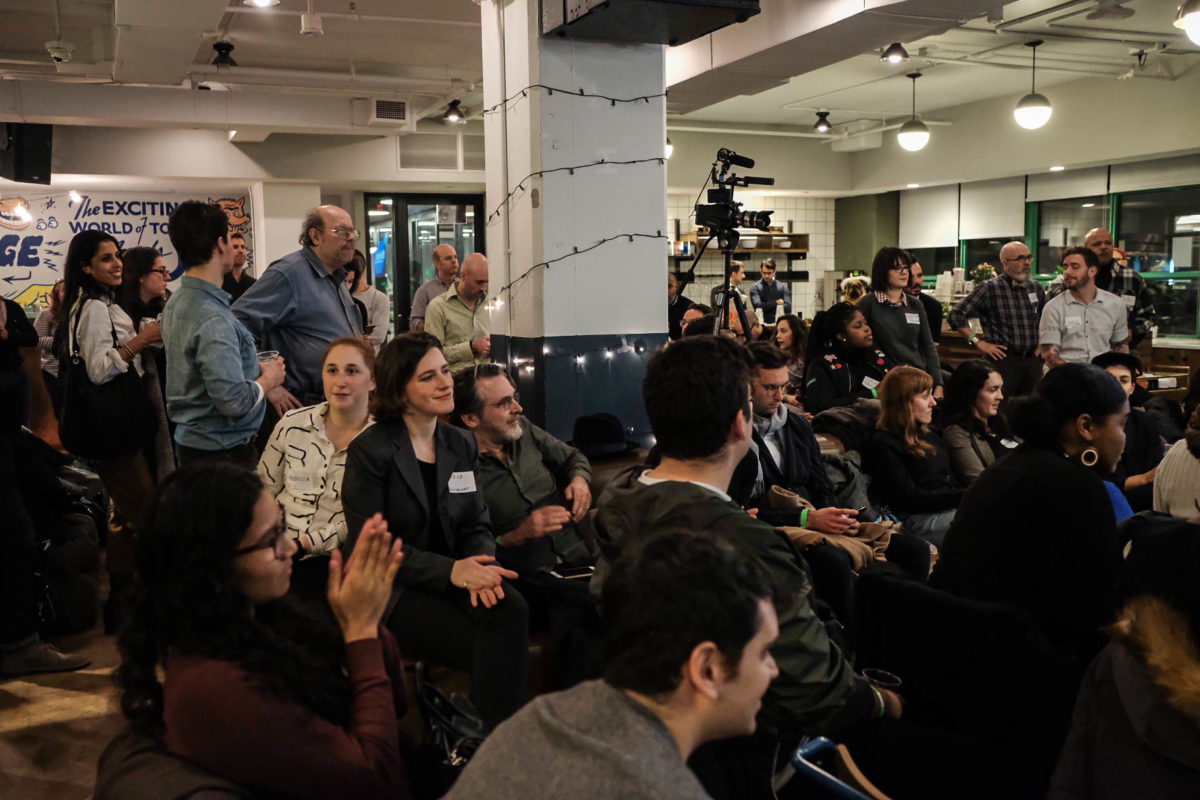More than two dozen of Brooklyn’s sharpest entrepreneurs, civic leaders, artists and engineers squeezed into a conference room at the Dumbo Heights WeWork prior to the Brooklyn Innovation Awards to talk about what’s next for Brooklyn tech.
On display was not only a meeting of leaders in the borough’s tech world, but the profound diversity of experience and skill in what we must broadly define as “tech.” Dunia DuPont of New Lab brought a team of folks from the new manufacturing workspace; Bill Cromie, the Director of Emergent Technology at Blue Ridge Labs, was there; Georges Clement, cofounder of startup JustFix.nyc, spoke up for civic tech; Ellen Jorgensen, of the community hackerspace/biolab Genspace, talked about bioengineering and CRISPR; and Marisa Prefer, of the public art piece Swale, a floating food forest barge docked in the East River, was there to talk about art and innovation; to name just a few of the nearly 30 in attendance.
The conversation around table focused on the challenges of the Brooklyn tech world, and — this being a table of entrepreneurs and startuppers — how to solve them.
Bridging the divide
The theme of there being two Brooklyns came up. In a year that saw a protest in Downtown Brooklyn of a pitch competition as a symbol of gentrification, Brooklyn’s inequality is on the minds of many. Just five miles separate shiny waterfront tech startups from neighborhoods where the murder rate rivals those of Newark and Chicago. To what degree is it the obligation of those who reap from the financial bounty of the tech world to reach out and help those further inland in the same borough?
“We work with teens who think technology is just a website,” said Story Bellows, the Chief Innovation Officer for the Brooklyn Public Library who previously worked for the City of Philadelphia. The library is working to offer more free classes for kids in coding and tech literacy, she said.
That there is a waterfront labor market looking for good workers and an inland labor market starving for good jobs was not lost on anyone. Various people at the table threw out ideas for how to get the two to meet each other.
Breakthrough Solutions founder Lawrence Lovell, who won a pitch competition in 2016 to jumpstart his teen counseling program, explained how the pressure and anxiety of poverty seriously retards the human capital of lots of young men in Brooklyn. One thing his young company is working on is how to get young men to deal with anger, especially, in ways that are productive. That even if tech skills could be acquired in the high school years or beyond, it won’t matter if the symptoms of poor emotional health aren’t lessened.
Eddie Summers, founder of the Brooklyn Education Innovation Network, talked about the hundreds and hundreds of local college students his organization has been able to match with Brooklyn tech firms and institutions, giving local undergrads top-notch tech-world experience.
Location, location, location
Another of the topics discussed was the price of real estate in the borough, not an altogether unrelated topic to the first. With glass towers going up at quite a clip, Brooklyn seems to be taking full advantage of wealth and capital spilling over the banks of the river from Manhattan. Everyone has their own story about rent going up, but what’s maybe more interesting is whether there’s enough demand to fill all these square feet.
Coworking spaces, in particular, have boomed.
“I do think there’s a glut of supply,” Micah Koch of UrbanX said. That means that young tech startups have ample office space to grow into, with prices unlikely to see the kind of huge increases they’ve experienced recently.
And this is where the discussion circled back to access and what people can do to lower the barriers to entry for newcomers to the scene.
There are no easy answers, obviously, for how “town and gown” can work harmoniously and cordially together. But talking it over, seriously, earnestly, with the perspectives of stakeholders from all disciplines of the tech world together, would seem to be a way to work toward some solutions.
Before you go...
Please consider supporting Technical.ly to keep our independent journalism strong. Unlike most business-focused media outlets, we don’t have a paywall. Instead, we count on your personal and organizational support.
Join our growing Slack community
Join 5,000 tech professionals and entrepreneurs in our community Slack today!
